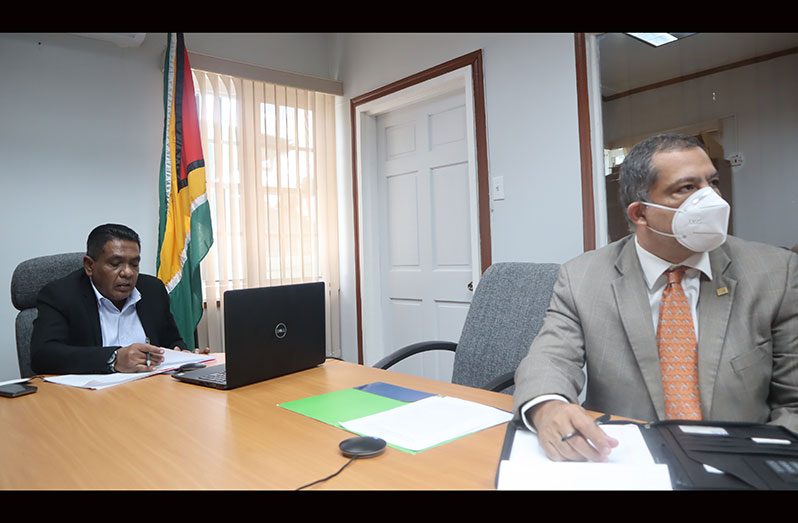— ministry to procure 255 tablets to boost extension services in rural areas this year
GIVEN the undeniable need to improve agricultural connectivity in rural areas and overall technological innovation systems in Guyana, Agriculture Minister Zulfikar Mustapha said that Rural Digital Inclusion is now seen as a priority, and remains key to development in Latin America and the Caribbean region.
The minister was, at the time, delivering remarks at the Inter American Institute for Cooperation on Agriculture’s (IICA) Development of Skills for Rural Digital Inclusion in Latin America and the Caribbean virtual event.
During his presentation, Minister Mustapha said that Guyana is cognisant of the fact that technology is important for the advancement of the sector, as well as ensuring timely responses to farmers’ needs are met, more so now as countries battle with addressing the challenges in the agriculture sector due to the current global pandemic, COVID19.
“Transformation in our agriculture and food systems will be evident as the level of technological innovation increases in the region. Communications, operations, and transactions will be revolutionised, and we will see the creation of smarter farms and more inclusive and transparent value chains. In Guyana, despite several research challenges, there has been the establishment of a biotechnology laboratory at the National Agricultural Research and Extension Institute (NAREI) as efforts are made to work on crop improvement and enhancing crop diversity. Recognising the critical role of extension in the rural economy, in 2021 we will procure 255 tablets for crops and livestock extension officers to improve advisory and traceability system, which will allow for proper monitoring, more efficient data collection, and management systems and farm traceability,” Minister Mustapha said.
He further stated that it was important to note that ICTs can be highly complex and require proper training on their operation and maintenance and that rural farmers and other beneficiaries would require training and other assistance in that regard.
COLLABORATION
IICA is currently collaborating with the Inter-American Development Bank (IDB) and American multinational technology company, Microsoft, to develop a document addressing the development of skills for rural digital inclusion in Latin America and the Caribbean. It was noted that a large part of the documents generated have produced data in order to measure the problem of access to connectivity as one of the critical issues that need to be reversed soon.
Among the advances developed, information has been generated that made it possible to diagnose the scope of the crisis in production and the limits to telework due to the lack of connectivity; gaps between and within countries have been measured; existing barriers were identified in terms of infrastructure and in the expansion of coverage; regulatory practices; limitations on affordability; the disadvantages in women’s access to digital technology, among others.
Director-General of IICA, Dr. Manuel Otero said that the pandemic caused by the spread of COVID-19 has magnified the urgent need for this type of inclusion.
NEED INTENSIFIED
“The need has intensified as a result of the social-distancing measures implemented and the sudden digitisation of work, education and trade, and millions of people modifying their daily routines in an attempt to limit contagion. So far, we have succeeded in generating considerable awareness and mobilisation of governments in favour of a pro-connectivity agenda, as witnessed by the important presence of officials from dozens of countries in the recent forums organised by IICA to discuss the issue and promote more and better changes. We are now taking another huge step, along with IDB and Microsoft, towards the adoption of digital skills among the rural population in Latin America and the Caribbean, so as to deal with the issue of leveraging the technological and digital resources that connectivity affords us,” Dr. Otero said.
Data from a survey of cases in the region, which forms part of the study carried out from the IICA offices at the beginning of 2021, where recent experiences of training in digital skills in rural areas are recorded, as well as initiatives that promote incorporation of technologies in agriculture that have the potential to be replicated, were also recorded in the report.
With International Women’s Day being observed on March 8th, Minister Mustapha said that government will continue to work with its regional and international partners to bridge the gender gap and empower rural women while developing their digital skills.
“Being cognisant of the gender divide particularly in rural areas, women must be given equal access to technology and skills training. As we celebrate International Women’s Day today, I wish to recognise the important role that women play in the agriculture sector. As we address the gender gap we will work to empower our rural women. Women can expect to benefit from initiatives that will develop their digital skills,” Minister Mustapha said.




.png)









